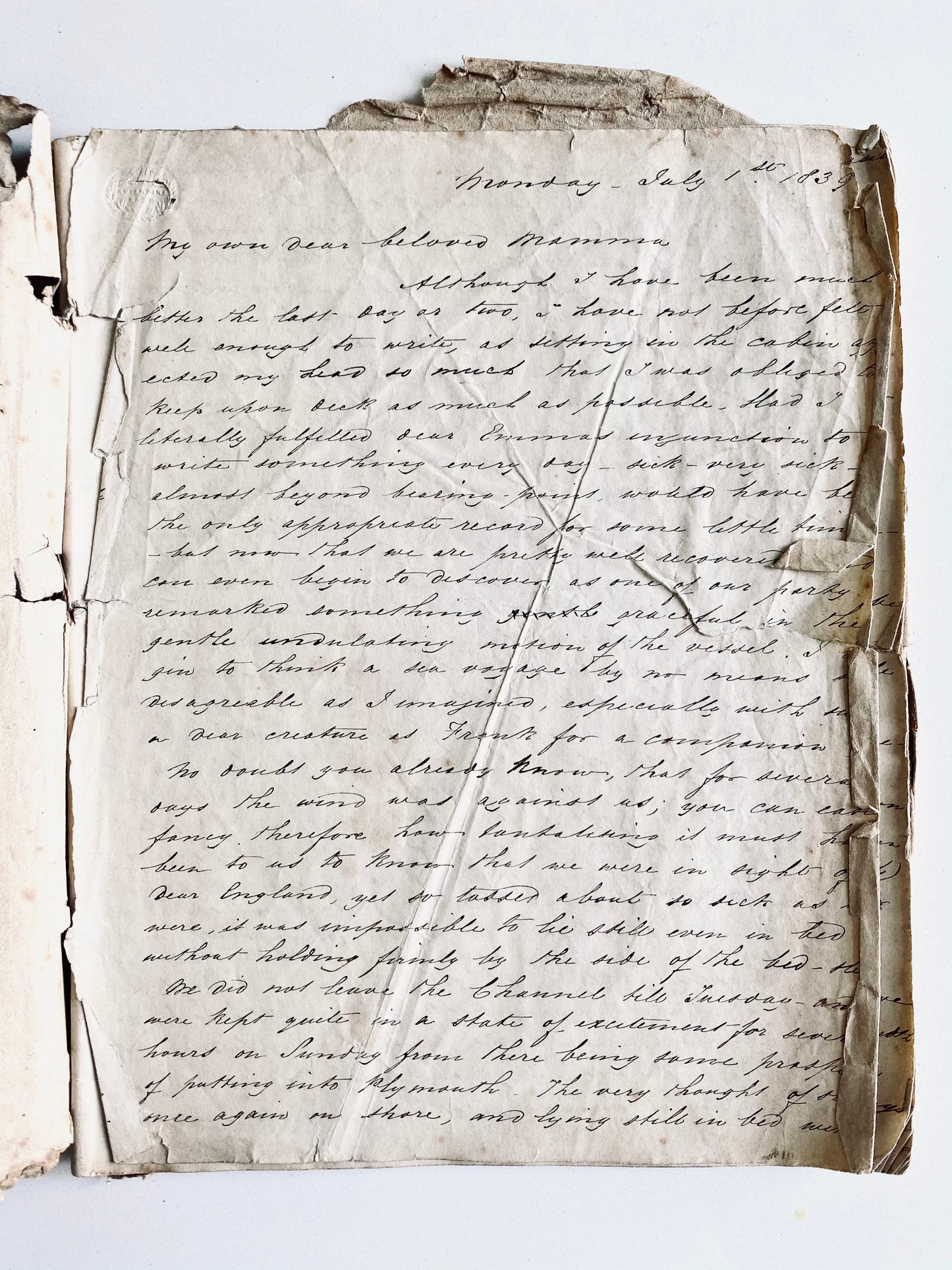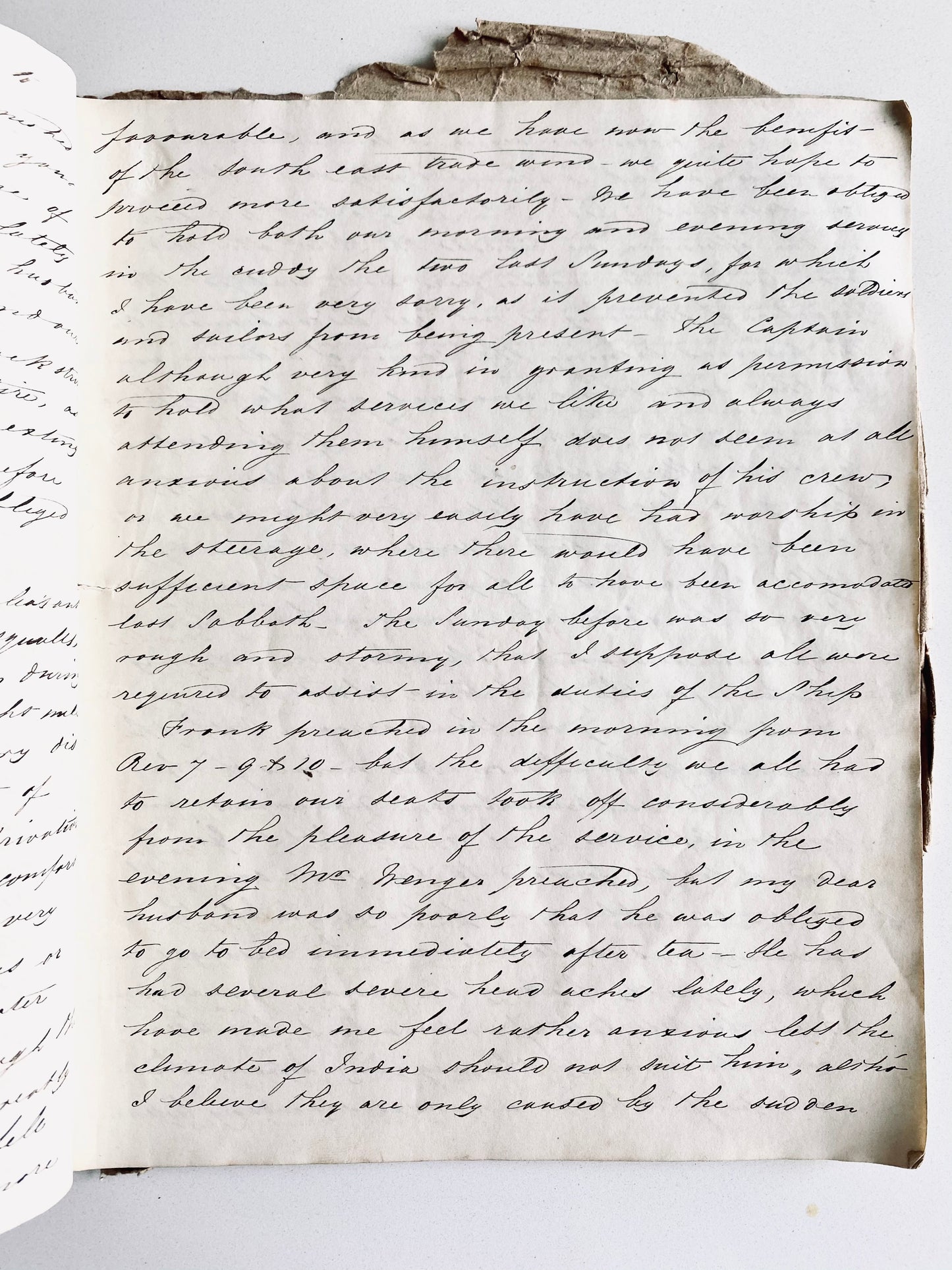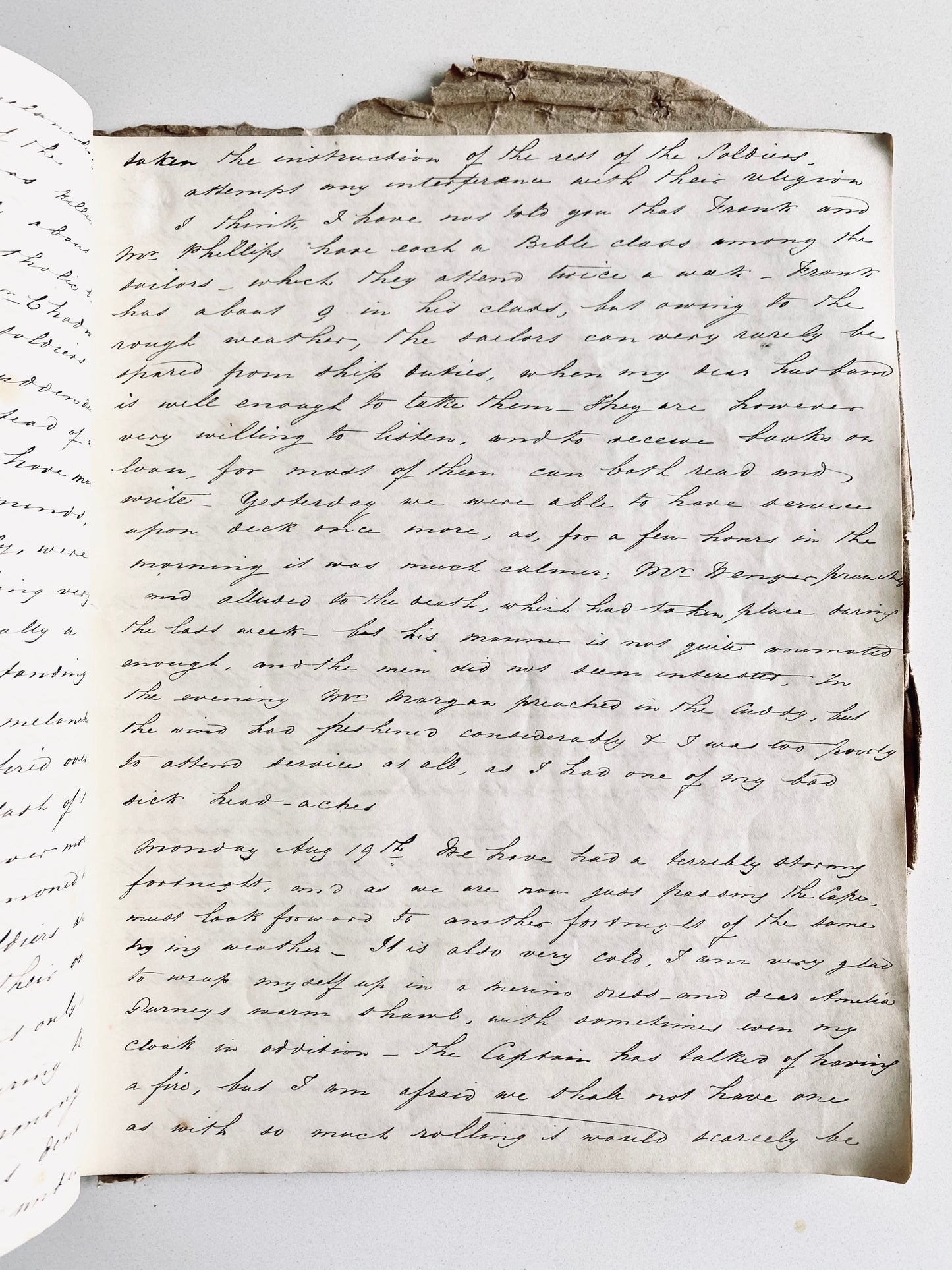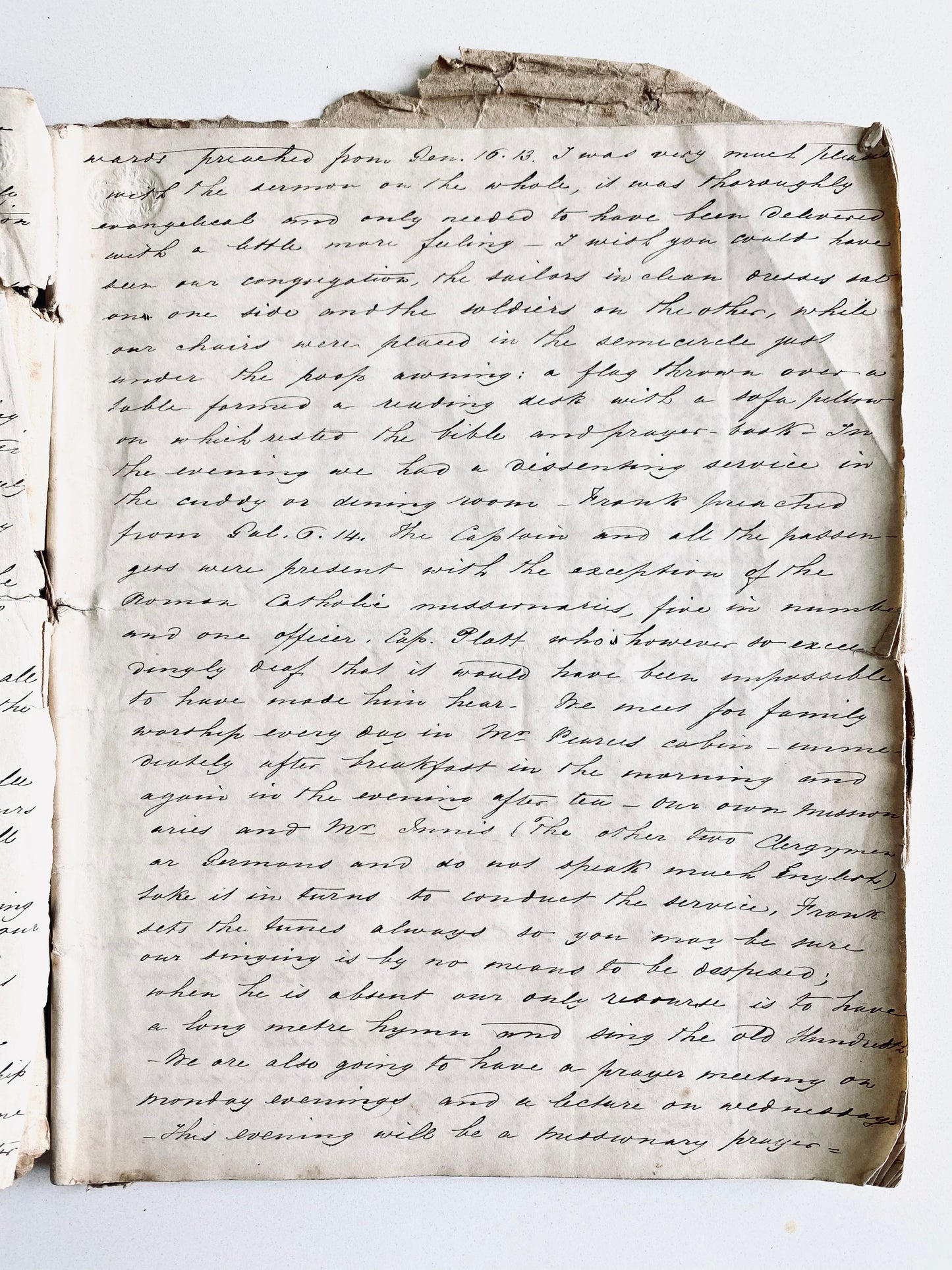Specs Fine Books
1839 SERAMPORE | BAPTIST MISSIONARY. Unpublished Original Manuscript Diary from Pioneer Missionary to India.
1839 SERAMPORE | BAPTIST MISSIONARY. Unpublished Original Manuscript Diary from Pioneer Missionary to India.
Couldn't load pickup availability
The present exceptional 30 page, 7200 word unpublished manuscript diary of Caroline E. Tucker, wife of Frank Tucker, of the Baptist Missionary Society at Calcutta and Serampore is a true treasure. Opening from the deck of their ship, the Plantagenet, on July 1st, 1839, she writes in letter form to her mother in great detail about their voyage, sicknesses, incredibly descriptive passages on near wrecks at sea, language training, various persons associated with the Baptist Mission, and their arrival and early days at Calcutta. The diary closes November 22, 1839. A true, unresearched, unpublished piece of early Baptist history.
Along the way we interact with such Baptist Missionary Society luminaries as William Yates, William Pearce [son of Samuel Pearce], John Biss, J. Wenger, and more!
“My own dear beloved momma. Although I have been much better the last day or two, I have not before felt well enough to write, as setting in the cabin affected my head so much that I was obliged to keep upon deck as much as possible. Had I literally fulfilled dear Emma’s injunction to write something every day – sick – very sick – almost beyond bearing – pains would have been the only appropriate record. But now that we are pretty well recovered, we can even begin to discover as one of our party remarked, ‘something graceful in the gentle undulating motion of the vessel.’ I begin to think a sea voyage by no means so disagreeable as I imagined, especially with such a dear creature as Frank for a companion.”
“Frank took refuge in the swinging cot and then by dint of changing from one side of the bed to the other every time the ship tacked, I managed to keep myself from rolling quite so much as before but even then to sleep was impossible. All night it blew quite a gale and the roaring of the wind & waves, the falling of the boxes and trunks, the “pull away” of the sailors, and the “helms a lee there” of the chief mate made me long for an hour’s quiet rest in my own den’s little room at Vauxhall.”
“We had worship in the morning on the quarter deck. Mr. Innis, one of the Church missionaries, read prayers and afterwards preached from Gen. 16.13. I was very much pleased with the sermon on the whole. It was thoroughly evangelical and only need to have been delivered with a little more feeling. I wish you would have seen our congregation, the sailors in clean dress sat on one side and the soldiers on the other, while our chairs were placed in the semicircle just under the poop awning. A flag thrown over a table formed a reading desk with a sofa pillow on which rested the bible and prayer book. In the evening we had a dissenting service in the cuddy, or dining room. Frank preached from Gal. 6.14. The Captain and all the passengers were present with the exception of the Roman Catholic missionaries, five in number, and one officer. Cap. Plast is so exceedingly deaf that it would have been impossible to have made him hear. We meet for family worship every day in Mr. Pearce’s cabin. Immediately after breakfast in the morning and again in the evening after ten. Our own missionaries and Mr. Innis [the other two clergymen are German and do not speak much English] take it in turns to conduct the service. Frank sets the tunes always so you may be sure our singing is by no means to be despised; when he is absent our only recourse is to have a long metre hymn and sing the old Hundredth. We are also going to have a prayer meeting on Monday evenings and a lecture on Wednesday. This evening will be a missionary prayer.”
“I have also commenced studying Bengalee. Mr. Wenger is our teacher and you can easily imagine not a very severe one. The language appears by no means difficult – indeed I feel it quite an acquisition to have some regular employment every day to look forward to, otherwise a ship life is very monotonous. I felt it rather formidable however, when on the first morning I found myself in the same class with three clergymen and a dissenting minister. The latter however occasionally renders me a little assistance in a whisper, although Mr. Wenger shakes his head, and Mr. Innis says, “What convenient things husbands are Mrs. Tucker.”
“Last Wednesday we passed Madeira and although we were about 25 miles distant we could see the coast quite distinctly. It looked very beautiful with the afternoon sun shining just upon it. I quite longed to land, particularly as we heard many inviting accounts of its beauty and verdure from all the passengers who had visited it. The rocks are very high, and we could still see its outline against the sky by moon light.”
“This morning we heard that a ship was in sight. Of course the first question was ‘Is she a homeward bound?’ She was not – but still, a ship, homeward or outward was a novelty, and in a few minutes everyone was on the poop – as she appeared bearing toward us, the Captain had given orders to slacken sail, wishing to hold some communication with her, he therefore told us ladies to be prepared, should she prove to be a pirate, for although she had hoisted English colours, he could not tell what she really was*.”
“Breakfast seldom occupies more than twenty minutes, and then we adjourn to Mr. Pearce’s cabin for family worship, where in addition to our party and the other missionaries, we generally have present Hon. Edward Hastings, brother of the Early of Huntingdon, Mr. Morris, a very pious man, formerly a Judge at Patna, with his daughter, and sometimes Capt. Farrant – Mrs. Platt, the wife of another officer, and Mr. Care, a cadet. At 10 O’clock Mr. Wenger summons us to Bengalee for an hour and a half, after which we sit upon deck and either read of work, our only interruption being biscuits and wine at 12 O’clock. . . .”
“. . . in the evening, Mr. Wenger preached, but my dear husband was so poorly that he was obliged to go to bed immediately after tea – He has had several severe headaches lately, which have made me feel rather anxious, lest the climate of India should not suit him, although I believe they are only caused by the sudden transition from one degree of temperature to another, which is always trying to the best of constitutions.”
“Last Thursday, about 4 o’clock in the afternoon we crossed the line [the equator], and tell poor Louisa her worse fears were realized – the practice of shaving is not yet discontinued – On the previous evening the sound of a drum warned us that something unusual was taking place. Coming upon deck we saw one of the sailors fantastically dressed as Neptune’s Secretary, having a large port folio under his arm, and accompanied by two attendants, a drum and fife. After a great deal of parade he presented a letter to the Captain, informing him that Neptune demanded all who were crossing the line for the first time should undergo the usual ceremony on the morrow – with the exception of Mr. Pearce – the names of the missionaries, churchmen, dissenters, and Roman Catholics were in the list subjoined and I looked forward to the next day with no very agreeable anticipation. . . and there I could not help laughing at the ludicrous scene presented . . .” [This section describing the ceremony in great detail, and quite comically, is extensive]
“About two o’clock we were alarmed by a terrible quarrel between the soldiers and a sailor, when Mr. Palmer interfered and fetched a sword to intimidate the sailor – he was very much exasperated – and was immediately joined by his comrades, while the soldiers took the part of their officer - as there were many of them slightly intoxicated, they fought most furiously and were with the greatest difficulty separated by the joint effort of the Captain, officers, and gentlemen passengers. As arms had just been fetched by some of them, I do not know what might have been the result had it gone much further.”
“Since I wrote last a very melancholy accident has occurred – Last Monday one of the soldiers fell down the hatchway and was killed on the spot. He was quite a young man, only about 19 years of age. As he was a Roman Catholic he was buried the next morning by Mr. Chadwick about 8 o’clock. Many of his fellow soldiers seemed very much affected by his sudden death and I therefore felt very sorry that instead of a short solemn address, which might have made some lasting impression on their minds, a few unintelligible Latin prayers only were read at the funeral. There is something very affecting in a funeral at sea, especially a military funeral.”
“Last Thursday we had a scene that would have amused the little boys, catching a shark – A large hook was lowered into the water with two or three pounds of pork for a bait – in a few moments a shark approached and seized it. When the hook caught its lower jaws and passed completely through it. It was there drawn out just above the water, and as we were watching the operation from the stern windows of Mrs. Pearce’s cabin it was not more than two yards from us – while the sailors were raising it however, its jaw broke, and the hook slipped away, and the prize was lost, to the great disappointment of the sailors, who were looking forward to broiled shark for their dinner, a very favorite with them.”
“We expect to reach Calcutta the day after tomorrow. We saw land for the first time since we passed Madeira at six o’clock yesterday morning and the first object which you see in this heathen land is the gilded pagoda of the temple of Juggernaut. We have passed several fishing boats manned with natives, looking exactly like the pictures we often see of India.” [Loc: River Hoogley]
“Calcutta. Oct 1st 1839. My dearest Mamma. Last Friday at 3 o’clock in the afternoon we anchored off Calcutta and my first view of this far-famed city struck me as greatly resembling Hyde Park corner and its neighbourhood – Extending down to the river is a very large open space intersected by roads, which are surrounded by noble looking houses and called ‘the Courde.’” [Detailed account of her first look at the city follows]
“Yesterday I drank tea at Mrs. Penney’s with Mrs. Phillips . . . Frank did not accompany me, as a meeting of all the brethren had been appointed at Mr. Yates to decide upon the most appropriate stations for the new missionaries. We afterwards went to the prayer meeting, but such a contrast to Camberwell! There were only about 20 persons present – half of whom were our own party from the “Plantagenet.” One of the deacons conducted the meeting, for Mr. Yates has been so much occupied in translations that he has found the Thursday evening lecture as much as his time would allow him to attend to during the week.”
“Last Sunday we went to Circular Road Chapel with Mr. and Mrs. Biss. Mr. Parsons preached in the morning and Frank in the evening from Romans III – 20 – 24.”
Mentions are made of:
Mr. and Mrs. William Hopkins Pearce [Son and daughter-in-law of Samuel Pearce; Mr. Pearce would die shortly hereafter and Mrs. Pearce would marry William Yates; William’s sister Anna married William Carey’s son Jonathan]
Mr. and Mrs. John Biss [who first arrived with William Carey and signatory of the original Serampore documents],
Mr. J. Wenger [Teacher of Bengali at Calcutta; Revised Yates’ Translations for Publication, etc.],
William Yates [who worked with William Carey on the translations at Serampore, etc.]
Mr. Innis, Mrs. Ellis, Mr. & Mrs. Parsons, Mrs. Penney, Mr. and Mrs. Thomas, Mr. and Mrs. Phillips, and more.
*The boat was the Lascar heading from Greenock to Batavia. This particular section is quite descriptive.
Share










